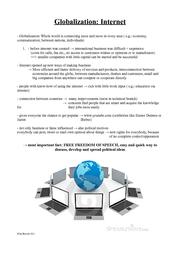colloquium2014
Aus RMG-Wiki
< Q12 Englisch | Thelenberg 2013 14
Version vom 9. April 2014, 21:45 Uhr von Theli34 (Diskussion | Beiträge)
Inhaltsverzeichnis |
Topics for 11/2
Muslims in Britain
Texts
- Problematic issues between British Muslims and the "Christian" majority
- A problem of perception: Muslims are well-integrated in Britain – but no one seems to believe it
- Reflections of a Former Islamist Extremist
- Read from beginnin to "And it's a very powerful grip on one's mind. And in my case it took years to shed that influence." (third box)
- Answers to book, p. 86/87 q. 5 + 6
- Why does a young muslim turn into an extremist?
- crucial event: death of thousands of European muslims in war in Bosnia in 90s! West just watches and doesn't help the muslims there. (Parallels to wars in Iraq .... muslims are being killed and no-one cares)
- Islam is cleverly presented as way of looking at history: like in Marxism it is always a struggle, them against us, bad against good, everybody against the muslims (idea of Western/Jewish conspiracy against Islam/muslims)
- at school/in university young muslims become part of an active, organized, outspoken movement ⇒ proud to be an active muslim, feeling of power, feeling of belonging to group and of changing the world.
Cartoon ⇐Klick!
- 4 frames, three show acts of violence/hatred committed in the name of Christianity/Western Civilization
- evangelical pastor [=church] burning Korans, evangelical/conservative politician [politics] against building mosque in USA, secret service agent [=government] torturing terrorist suspect)
- irony: they all want revenge/act as unchristian/intolerantly as those they accuse of doing this to them
- irony: preacher is completely stupid: of course "them folks don't act like Christians" - they simply aren't christians!
- preacher also doesn't seem to know his Bilble: "Jesus hates Mohammed" is absolutely like anthing Jesus preaches in the Bible: Jesus preaches love, peace and forgiveness - not hatred!
- picture four shows the result: children in USA have learned, that you needn't act as you wish others to act towards you (in civilized way, mercyfully, helpfully, tolerantly ...) but can do anything you want as long as nobody stops you.
- General criticism: christian/western preachers and politicians and governments do the same things they accuse terrorists and radical islamist of ⇒ they are no better than them.
Globalization
Definition and Key Facts
Cf. Book, p. 178
History / 3 Phases of Globalization
Globalzation 1.0 (first phase/era) - 1492 (Columbus) until around 1800
- world got connected, shrank from size L to M
- trade between Old World and New World
- countries' power defined by use of horse power/wind power/steam power/ (horses, ships, engines)
- aim: to fit into global competition
- motivation often religion / imperialism
Globalization 2.0 (second era) - 1800 to 2000
- interrupted by the Great Depression, World War I and II
- world got more connected, shrank from size M to S
- industrial revolution and multinational companies (e.g. East India Company) as most dynamic forces
- global integration ⇐ breakthroughs in hardware development
- 1. falling transportation costs (steam engine, railroad, cars, airplanes)
- 2. falling telecommunication costs (telegraph, telephone, PC, satellites ...)
- development of really global economy ⇒ massive movement of goods and information
Globalization 3.0 (third era) - from 2000 to …
- world got even more connected, shrank from S to XXS and countries got even closer
- newfound power for individuals to communicate, collaborate, compete globally
- key developments:
- - fiber-optic cable + Internet + work flow software + mobile computing
- - final end of simple East/West division
- ⇒ very small, flattened world/playing field (many forces on same level, even individuals are very powerful)
- - China has become more powerful
- - now much more diverse, non-white, non-European influences ⇒ West no longer dominant in globalization
Source: Friedman. The three eras of globalization (Book, p. 176f)
Pros and Cons
- Globalisation: Pro - Con 1
- Globalisation: Pro - Con 2
- Book, p. 178
.
Talks
Globalisation and the Internet
Globalization and culture


